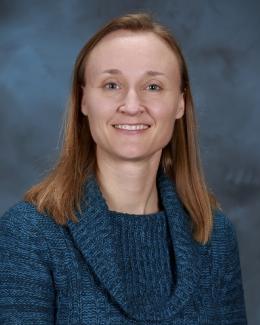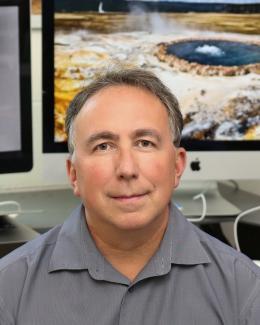Mircea Podar has travelled around the world and to the bottom of the ocean in pursuit of scientific discoveries, but it is the uncharted territory he encounters when working with new microbes that inspires his research at Oak Ridge National Laboratory.
Podar is advancing our understanding of microbial communities, a scientific frontier that has gained traction in recent years as researchers explore the critical role these microorganisms play in everything from human health to environmental change.
Using traditional and new genomic approaches, Podar studies novel microbes—especially organisms that have never before been grown in a laboratory. His pioneering research has potential applications in facilitating medical breakthroughs, addressing mercury contamination, and developing more resilient crops and bioenergy feedstocks.
“These are microbes nobody has ever grown or seen or studied before,” Podar said. “There are many applications, but I’m interested to understand microbes just because they are there.”
Podar collects and studies microbes from soil, groundwater, humans and animals, and from thermal pools in locations like Yellowstone National Park, Iceland, New Zealand, and the Azores.
Growing these wild microbes in the lab is no easy feat. It requires rigorous scientific investigation to deduce the microbes’ lifestyle requirements and create a viable environment for them in a test tube or petri dish. Many of these organisms are dependent on other microbes. Podar and his team must determine how those relationships work and supply any missing nutrients to enable the microbes to thrive in isolation. A bit of finesse and luck speeds the process.
Podar and colleagues recently cultivated a novel microbe from the human mouth—Desulfobulbus oralis—that is present in adults with periodontitis, an advanced gum disease affecting nearly half of all adults worldwide. By studying the microbe in the lab, researchers can learn about the role it plays in oral disease. This knowledge can guide development of alternative treatments and possible prevention of periodontitis and tooth decay.
Understanding the so-called ‘dark microbiota’ of uncultured microbes is what inspires Podar’s work. There could be millions and millions of species of microbes, and we can only grow a tiny, tiny fraction of those in the lab, Podar said. “Think of how much biological diversity we’re not actually culturing or learning about.”
Podar isolated and cultured an elusive Yellowstone microbe—just 100 to 300 billionths of a meter in size—that lives symbiotically with another microbe in an acidic, near-boiling thermal pool. The study of these ancient microbes illustrated how organisms adapt and interact with other microbes to survive in hostile environments.
Examining the role of microbes in generating the toxin methylmercury in the environment is another focus of Podar’s work. Applying a range of genetic approaches, Podar contributed to the discovery of the two genes that allow microbes to convert mercury into methylmercury. The discovery solved a 40-year mystery and energized the scientific community investigating ways to prevent or lessen the spread of the toxin. His studies since then have confirmed how widespread these genes are in the microbial community and proposed the genes’ origin in microbes known as methanogens.
Podar and his team also discovered a new variation in the genetic coding of an uncultured bacterium from the human oral microbiome. Genetic recoding like this is rare, with only a handful of similar discoveries made in the past several decades.
“I’m driven primarily by doing something first that nobody’s done before,” he added.
Unlocking the secrets of life
Podar took a circuitous path to find his calling studying microbes. As a child in Romania he examined drops of water and bits of soil through a microscope. After securing his bachelor’s degree in biology from the University of Romania in Transylvania, Podar taught middle school science, then worked as a teaching assistant at the university while studying for his GRE.
He moved to America with his acceptance into the doctoral program at the University of Texas, Southwestern Medical Center in Dallas. There he studied the biochemistry of early life dating back to the RNA world for his doctorate in biological sciences.
As part of a postdoctoral scholarship, Podar worked with a zoologist at Woods Hole Oceanographic Institute in Massachusetts. Twice he journeyed 2,500 meters into the depths of the Pacific Ocean in the submersible Alvin, studying comb jellies and the microorganisms around black-smoking hydrothermal vents.
From there, he took a postdoctoral position at the Salk Institute, investigating the evolution of HIV and related viruses and how they infect cells. Podar then moved to a biotech company where he cultured and studied microbes making novel enzymes for industrial and medical applications.
In 2007, Podar joined ORNL as an R&D scientist and found a place where he can integrate his many experiences and interests. Now the lead for the Systems Genetics group in the Biosciences Division, Podar appreciates the collaborative research environment and resources at the laboratory. He feels well-equipped for his fundamental research: unravelling the mysteries of how microbes function and interact, influencing the health of humans, plants, animals, ecosystems and ultimately our planet.
In his time away from the lab, Podar enjoys cooking, photography and scuba diving as well as mentoring his two teenage sons about science. His office walls are decorated with pictures he took of colorful comb jellies and other ocean creatures during his time at Woods Hole.
ORNL is managed by UT-Battelle for the DOE Office of Science. The single largest supporter of basic research in the physical sciences in the United States, the Office of Science is working to address some of the most pressing challenges of our time. For more information, please visit energy.gov/science.








